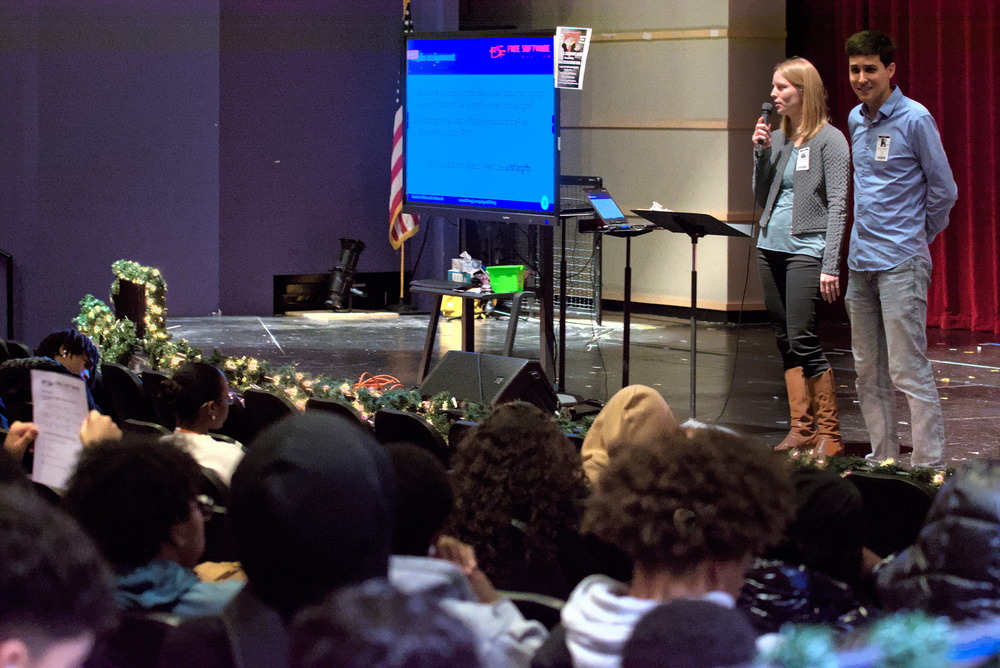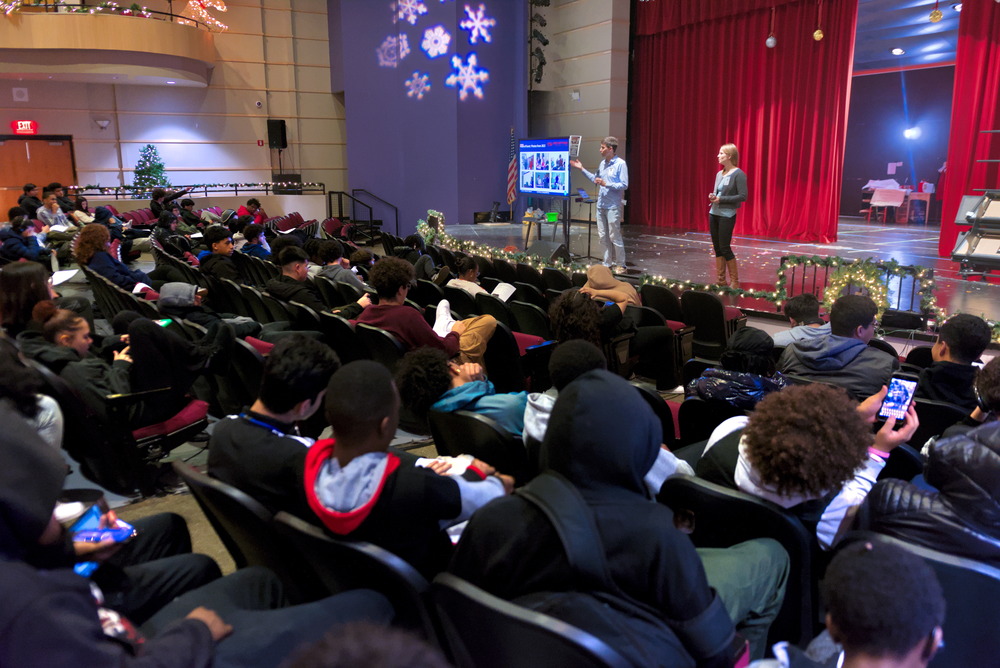|
Please consider adding [email protected] to your address book, which
will ensure that our messages reach you and not your spam box.
Read and share online: https://www.fsf.org/blogs/community/free-software-in-education-and-free-software-education
Dear Free Software Supporter,

Free software is vital for education, and free software education
is vital for a free society. For this reason, my colleague Devin
Ulibarri and I visited Everett High School (EHS) last week and talked
with approximately sixty cybersecurity and robotics students about
free software. It was thrilling to meet all these students and to
learn what interests them. The teens asked us questions like "Is it
safe to use free software?" "What are examples of GNU software that is
widely used?" and "How can a high school student or someone who is
just starting college get involved with free software projects?" A
special thanks goes to cybersecurity teacher Neil Plotnick for the
opportunity to present to his students, and we would like to extend a
special thanks to all the teachers out there who educate their
students about, or by using, free software.
We want to encourage you to go down to schools in your area and teach
them how to use free software and why it's important, so we put all
the teaching materials we created for the EHS classroom visit onto the
LibrePlanet wiki so that you may download and use them for your
own lesson or presentation on free software. No matter if you are a
teacher looking for materials for your classroom, a student planning
on showing fellow students what free software is all about, or a free
software activist going on a classroom visit, you might find these
materials useful. Additionally, you are most welcome to add any
presentations, lesson plans, or handouts about free software you
create yourself! We also set up a page for teaching volunteers,
where you can add yourself if you are interested in teaching others
about free software.

During this year's fall campaign we're focusing on free software,
education, and how each one benefits from the other. There are
basically two dimensions to this: free software in education and
free software education. Both are imperative for a free society.
The FSF has a long history of advocating for freedom in the classroom
"Schools will be able to provide a much more educational environment
by encouraging all students to study and improve the system code."
This is a quote from the first ever Free Software Bulletin,
written in 1986. We can only learn in freedom if the software we use
is free. And young people will only develop and advocate for free
software if we teach them now to understand that proprietary
software, though omnipresent, is not the path to a free future.
This is why the FSF has advocated for free software in education from
the start, and has always continued to do so.
In 2020, during the beginning of the pandemic, the FSF alerted the
public to the dangers of proprietary software in the classroom,
wrote about free software for remote education, and launched a
petition for freedom in the classroom. This petition has
been signed by 1,633 people so far. We contacted hundreds of
educational institutions on behalf of the signers and invited them
into a discussion on how to truly educate the next generation of
technologically literate citizens, rather than serve as marketing and
influence arms for proprietary software companies. Nonfree programs
like Google Classroom, Microsoft Teams, and Zoom do not only invite a
malicious third party into the educational environment. More
importantly, they increase society's dependence on proprietary
software, software that denies its users their freedom. If you haven't
signed the petition yet, you can do still so now.
We didn't stop there. In the spring of 2022, we published our biannual
Bulletin with an article on the need for free software
education as well as an article examining how to overcome the
hurdle of "industry standard" in education technology. And
finally, LibrePlanet 2023 featured a keynote on education and the
future of software freedom, and we always try to include as many
free software in education sessions as possible in the schedule
of the annual LibrePlanet conference hosted by the FSF. Here's a
collection of my favorite LibrePlanet talks in this realm:
Free software education is ingrained in the FSF's mission
The FSF's mission is to promote computer user freedom worldwide.
A huge percentage of the FSF's advocacy consists of free software
education. Not only are our campaigns all about informing the public
on topics such as software patents, putting an end to Digital
Restrictions Management (DRM), or nonfree JavaScript. Our
campaigns team has also released various educational videos,
such as "Fight to Repair", "ShoeTool", "Escape to
Freedom", "Rewind", and "User Liberation" to help you
introduce to your loved ones what free software is all about.
In addition to all the work mentioned so far, we have no plans to
stop. The topic of this year's International Day Against DRM
(IDAD) was fighting for core educational principles, like
universal access and freedom from censorship.
And because we know that one of the best ways to learn about free
software, including its philosophy of freedom, is by using it, the FSF
regularly hosts workshops on free software, such as Kdenlive,
LeanWeb, or Newk script. Additionally, the Free Software
Directory contains a collection dedicated to books and online
tutorials as well as software for learning how to program. And,
the FSF tech team made 133 webpages of their sysadmin
documentation available to the public as well as the FSF Tech
Team Bash Style Guide, which you can use to learn how to use
automatic error handling while avoiding pitfalls.
By supporting us today, you help secure a free future, in which
everyone will be able to learn in freedom and will know their rights
as a user. There are a million and one more classrooms out there we
want to visit and myriads of users not knowing about software freedom
yet. If every reader of this email supports our efforts by ensuring a
contribution, we can increase our strength and expand our
reach. You can also advocate for user freedom by convincing just one
person to join the FSF. Any contribution made before December 31
will count towards achieving our year-end fundraising goal of
$375,000.
As stated in the FSF's mission, "the ultimate success of the
free software movement depends upon teaching our friends, neighbors,
and work colleagues about the danger of not having software freedom,
about the danger of a society losing control over its computing." This
mission, which is now more important than ever before, depends on you.
Yours in freedom,
Miriam Bastian
Program Manager
|